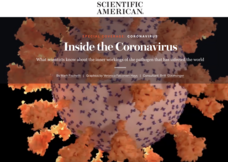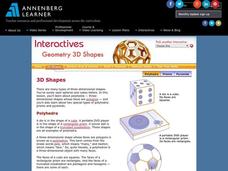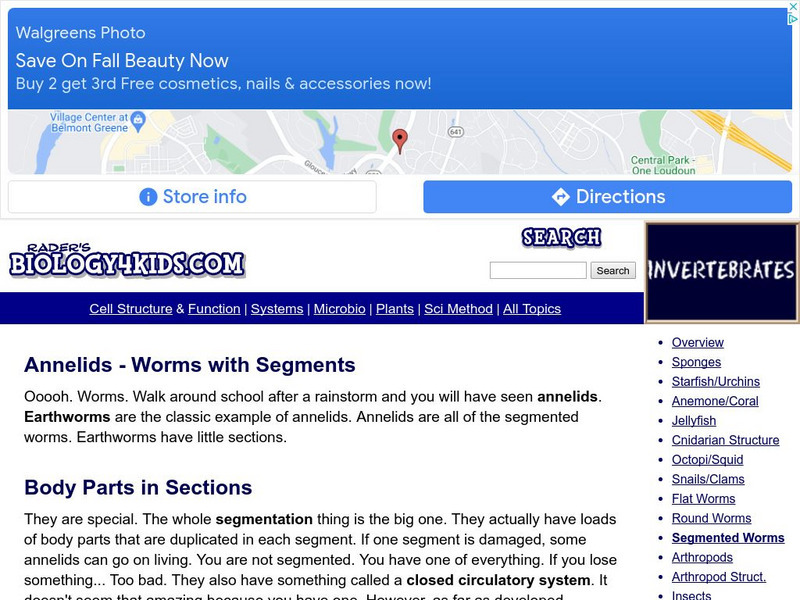Scientific American
Inside the Coronavirus
Take biologists on a journey into the heart of the Covid-19 virus with a series of stunning graphics and explanations about the global pandemic. Animations bring investigators up close to the virus, revealing its structure and movement...
American Museum of Natural History
Earthquakes Tremors From Below
Earthquakes are really no one's fault. A thorough lesson explains the different types of earthquakes how they happen. Learners interact with the online lesson to simulate earthquakes and examine their results. The lesson is appropriate...
American Museum of Natural History
Being an Astronomer: Neil deGrasse Tyson
An interview delves deep into the life of famous astronomer Neil deGrasse Tyson.
Annenberg Foundation
Geometry 3D Shapes: 3D Shapes
Explore vocabulary related to three-dimensional shapes. An instructional website describes the characteristics of different geometric solids. Learners can use an interactive component to view nets, faces, vertices, and edges of common...
Curated OER
Bized.com: Market Segmentation
This site, which is provided for by Bized.com, gives a definition and explanation of the bases of segmentation.
Biology 4 kids
Biology4 Kids: Annelids Worms With Segments
If you've dodged earthworms along the sidewalk after a rainfall then you have observed annelids. This text highlights these and other segmented worms.
PBS
Nova: Booming Sands
PBS site takes a look into a mysterious phenomena as to why and how certain sand dunes produce mysterious noises. Contains a link to watch a broadcast segment of an expedition into the desert as well as a recipe for noisy sands.
PBS
Pbs Learning Media: Two Points Determine a Line
In this video segment [2:10] from Cyberchase, Digit must make a straight line between the two points and then follow the path created.
PBS
Pbs Learning Media: Two Sightings, Different Information
Jackie and Matt are looking at the same object along two different lines, in this video segment from Cyberchase.
PBS
Pbs Learning Media: What's Your Name? (U)
This video segment from Between the Lions uses a fun hip-hop song about names to highlight the /uh/ sound that the letter "u" makes and to boost phonemic awareness: an understanding of the sounds within words.
PBS
Pbs Learning Media: Seven Selfish Shellfish
This video segment from Between the Lions features a classic tongue twister: a type of wordplay that helps children tune their ears to language and the sounds within words. [0:29]
PBS
Pbs Learning Media: Cave Formation: Biogeochemical Cycles
This video segment adapted from NOVA chronicles the discoveries that led to a radical new theory in which living organisms, not just geological processes, play an active role in cave formation. [5:42]
PBS
Pbs Learning Media: Mammals Get Their Chance
In this video segment adapted from NOVA, animations of an asteroid hitting Earth are used to illustrate this widely accepted theory of dinosaur extinction and the resulting conditions that favored mammals.
PBS
Pbs Learning Media: Above the Clouds: Telescopes on Mauna Kea
This video segment adapted from First Light explains why the highest peak in the Pacific, Mauna Kea, is an ideal site for astronomical observations. Featured are new telescope technologies that allow astronomers to explore the universe...
PBS
Pbs Learning Media: A Strange New Planet
This video segment adapted from NOVA features the first planet to be discovered outside our solar system. Its surprisingly large size and short orbit sent scientists back to their data and led them to discover similar planets. [3:06]
PBS
Pbs Learning Media: A Hole in the Sky
This video segment adapted from Interactive NOVA profiles two scientists who were surprised in 1984 to discover a hole in our atmosphere's ozone layer as big as the United States. [3:47]
PBS
Pbs Learning Media: Hurricanes: New Tools for Predicting
This video segment adapted from NOVA scienceNOW features new advances in predicting the intensity of hurricanes. [5:49]
PBS
Pbs Learning Media: Mountain Weather: A Climber's Story
In this video segment adapted from Interactive NOVA, a mountain climber's perilous journey reveals the extreme range of microclimates on Mount Kilimanjaro. [4:42]
PBS
Pbs Learning Media: Nisqually Glacier at Mount Rainier
Observe the Nisqually Glacier at Mount Rainier in this video segment from NatureScene. [4:07]
PBS
Pbs Learning Media: Redwoods at Redwood National Park
This video segment from NatureScene describes the characteristics of redwood trees at Redwood National Park. [4:02]
PBS
Pbs Learning Media: Selected Haiku by Issa
Learn more about the Japanese form of poetry known as haiku. In this video segment from Poetry Everywhere, the poet Robert Hass reads a short collection of amusing, often ironic haiku by Japanese poet Kobayashi Issa. [1:32]
PBS
Pbs Learning Media: Belle Isle, 1949, by Philip Levine
In Philip Levine's post-war poem, "Belle Isle, 1949," two strangers meet, swim, and part, exploring themes of connection, boundaries, and where we come from. This video segment comes from Poetry Everywhere. [1:29]
PBS
Pbs Learning Media: Everyday Radiation
How much radiation are we exposed to every day? Find out in this video segment adapted from FRONTLINE: "Nuclear Reaction." [1:46]
PBS
Pbs Learning Media: Gamma Ray Burst Theories
This video segment from Swift: Eyes through Time introduces and explains theories of the origin of gamma-ray bursts. [4:11]
Other popular searches
- Line Segments
- Phoneme Segmentation
- Geometry Lines Line Segments
- Segmented Worms
- Segment Addition Postulate
- Line Segments Rays
- Syllable Segmentation
- Perpendicular Line Segments
- Congruent Line Segments
- Proportional Segments
- Lines and Line Segments
- Market Segmentation







